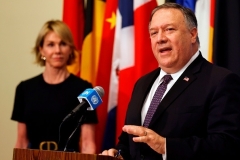
Secretary of State Mike Pompeo, flanked by U.S. Ambassador to the U.N. Kelly Craft, speaks at the U.N. on August 20, the day he gave the U.N. 30-day notice on restoring all Iran sanctions. (Photo by Mike Segar/Pool/AFP via Getty Images)
(CNSNews.com) – The Trump administration expects all U.N. sanctions on Iran, including an arms embargo, to come back into effect this weekend, and officials have signaled that announcements are imminent on how the U.S. will enforce them.
With very few exceptions, U.N. member-states – including the other four permanent Security Council members – dispute that the U.S. has the legal right to take the step, setting the stage for an intriguing standoff.
Secretary of State Mike Pompeo sounded unfazed about the dispute Thursday, saying simply that the U.S. “expect[s] every nation to comply with UN Security Council resolutions – period, full stop.”
“Come Monday, there will be a new series of U.N. Security Council resolutions that we enforce, and we intend to ask every country to stand behind them,” he told reporters in Suriname. “It’s pretty straightforward what our expectations are.”
As far as the administration is concerned, the sanctions will “snap back” into place at 8 PM Eastern Time on Saturday, in line with the 30-day notice Pompeo lodged with the U.N. secretariat in New York on August 20.
The U.S. took that step after failing to get the Security Council to extend the embargo on the sale of conventional arms to the Iranian regime. Under the 2015 nuclear deal negotiated under the Obama administration, the embargo was due to expire on October 18.
Sanctions “snapback” was a key element of the nuclear accord known as the Joint Comprehensive Plan of Action, and was lauded by the deal’s architects as one of its most notable features.
The Trump administration asserts that – even though it withdrew from the deal two years ago – it retains the right, under the Security Council resolution that enshrined the JCPOA, to trigger snapback because of Tehran’s non-compliance.
In the administration’s view, the reimposed sanctions will cover not just conventional arms sales to Iran, but also prohibitions on uranium-enrichment and processing activities, and on ballistic missile development and testing.
(The JCPOA placed limits on Iran’s enrichment activities, in return for sanctions relief. It placed no restrictions whatsoever on its ballistic missile program – one of the reasons President Trump gave for rejecting it.)
Secondary sanctions
What the U.S. will do if other countries ignore the sanctions remains to be seen, but Reuters reported on Thursday, citing unnamed officials, that Trump plans to issue an executive order in the coming days permitting the imposition of secondary sanctions against any country that disregards the embargo.
On Wednesday, special representative for Iran Elliott Abrams told reporters to expect “some announcements over the weekend and more announcements on Monday and then subsequent days next week, as to exactly how we are planning to enforce these returned U.N. sanctions.”
The threat of secondary sanctions has proven effective in the past because foreign companies are often loath to jeopardize their access to the U.S. financial system and markets.
Pompeo said at the State Department on Wednesday that “there were those who said” that when the U.S. restored its unilateral sanctions on Iran after exiting the JCPOA, they would be ineffective.
“I think we’ve been very successful in spite of what the world said would happen,” he said, pointing to “Iran’s financial situation today” and arguing that it no longer has the resources it needs to underwrite terrorist proxies.
Abrams also pointed to the U.S. sanctions’ effect on the regime’s economy.
“Whatever foreign ministries said, individuals, businesspersons, banks, companies around the world paid attention to the [U.S.] sanctions and did not wish to violate them,” he said. “I think you will see that happen again with respect to the reimposition of U.N. sanctions.”
China and Russia, the countries most likely to want to sell arms to Iran, have strongly rejected the U.S. attempts to extend the embargo.
Washington’s European allies, despite being concerned about the ending of the embargo, are anxious not to kill off the JCPOA altogether, and also challenge the right of the U.S. to initiate sanctions snapback now that it’s no longer a party to the deal.
Because the U.S. unilaterally ended its participation in the nuclear deal, European Union foreign policy chief Josep Borrell said last month, “it cannot, therefore, be considered to be a JCPOA participant state for the purposes of possible sanctions snapback.”






_2.jpg?fit=60,30&ssl=1)